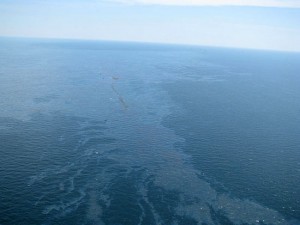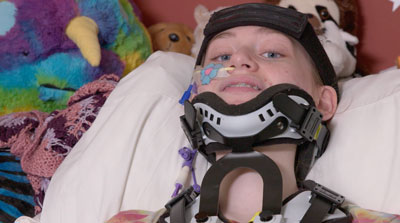by Annie Hopper
 The Gulf Oil Spill is a tragedy of immense proportion – the worst of which is still to come.
The Gulf Oil Spill is a tragedy of immense proportion – the worst of which is still to come.
Some of you may have recently watched the news and heard of the latest victims of this tragedy – our beloved dolphins. They are finding stranded and dead dolphins but cannot say for certain that their death is related to the oil spill.
Can anyone here say “denial”?
Unlike fish, dolphins breathe air. So every time they surface, they will swim through the toxic slick and breathe fumes at the surface.
And to add insult to injury, an equal threat will come from their food chain with eating the fish that are contaminated with oil. Eating toxic fish could suppress the dolphins’ immune system, making them vulnerable to pneumonia and other illnesses.
But what about the toll on human health?
There are numerous reports coming in now that many people who live along the Gulf Coast, or are involved in the clean up, are getting sick as well.
To Riki Ott, a marine toxicologist who studied the 1989 Exxon Valdez spill off Alaska, it’s “deja vu.”
“What we saw with Exxon Valdez was a parallel track — sick animals and sick people. Harbor seals were looking like they were drunk and dying … and autopsies showed brain lesions.”
People are flowing into local hospitals with symptoms of headaches, nausea, flu like symptoms, respiratory problems and sudden sensitivities to chemicals found in every day personal hygiene products.
This indeed is indicative of chemical poisoning, central nervous system dysfunction and is characteristic of an acquired toxic brain injury.
“What makes it challenging is that patients show up with non-specific symptoms. Headaches, fatigue, problems with memory and concentration, upset stomach,” lists Dr. Claudia Miller at UT Health Science Center.
The illness is called “TILT,” or Toxicant-Induced Loss of Tolerance. This is also known as Multiple Chemical Sensitivities or Environmental Illness. Patients lose tolerance to household products, medication, or even food after being exposed to chemicals, like burning oil, toxic fumes, or dispersants from the spill.
The recommendation from health officials is to avoid the substances that are making you sick. In theory, this sounds simple enough to do – except that these people live there.
What is also almost impossible for them to do is to avoid the chemicals that are found in every day products. There is an endless list of untested and toxic chemicals in your personal hygiene products alone. This also means that most of your friends and family are also using them. They are also lurking in the cleaning agents that you use in your home. Not to mention the new furniture, carpets and lovely paint that you just used to redecorate your children’s bedroom.
We are individually creating a toxic spill in our own homes and are unaware of the dangers that lurk there. And unfortunately, what happens with most people who develop Multiple Chemical Sensitivities (MCS) is that they were unaware of the dangers hidden there until they became sick.
This illness has no boundaries and affects everyone, not just the people who are living and working near the Gulf oil spill. In fact, I was the victim of this illness as well, along with millions of other people on this planet. The difference is I am one of the lucky ones who has completely recovered from this disabling illness.
Unfortunately most people who have MCS go undiagnosed and suffer for years because of the lack of medical knowledge and education in this area.
It is time for us to collectively wake up and change the way that we live on this planet. I can only hope that the Gulf Oil Spill becomes a big catalyst in this global wake up call.
Please go to lesstoxicguide.ca for more information about the chemicals found in the products you currently use and a list of healthy alternatives.
This article was originally published in Annie’s regular “Emotional Rescue” column on castanet.net.
Annie Hopper is a Brain Retraining Specialist and specializes in Acquired Limbic System Brain Injuries. Learn more at retrainingthebrain.com.









0 Comments